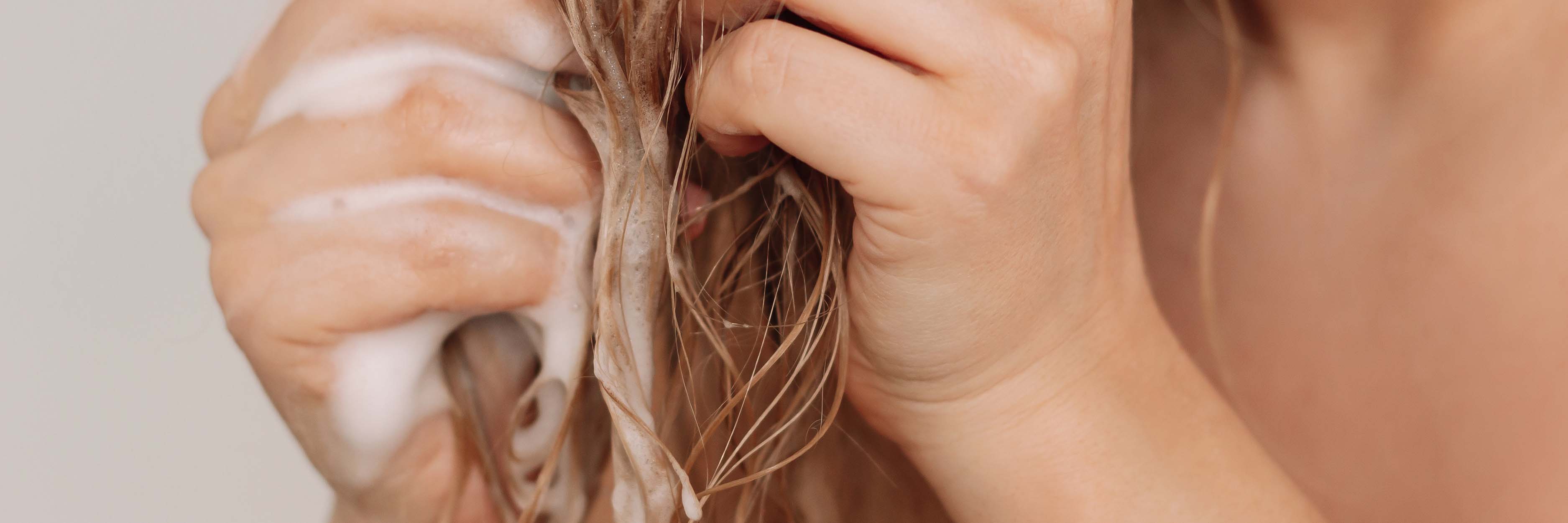酒さ、湿疹、皮膚炎、ニキビなどの敏感肌の症状に悩まされている場合、私たちは顔に使用する製品のみに注目する傾向があります。
同様に重要なのは、使用するヘアケア製品に気を配ることです。ヘアケア製品は敏感肌に大きな影響を与える可能性があります。多くの製品には、肌をさらに刺激したり、アレルギー反応を引き起こしたりする可能性のある成分が含まれているからです。
最も一般的な違反成分は次のとおりです。
- 香料:多くのヘアケア製品には、刺激、アレルギー反応、乾燥を引き起こす可能性のある人工香料や合成香料が含まれています。「無香料」と謳っている製品であっても、反応を引き起こす可能性のあるマスキング剤が含まれている場合があります。
- 硫酸塩:ラウリル硫酸ナトリウム(SLS)やラウレス硫酸ナトリウム(SLES)などの成分は、泡立ちをよくするためによく使用されます。これらの成分は刺激が強く、肌から天然の油分を奪い、乾燥や炎症を引き起こす可能性があります。
- 防腐剤:パラベン(メチルパラベン、エチルパラベンなど)などの防腐剤は、皮膚の敏感性を引き起こし、アレルギー反応を引き起こす可能性があります。
- アルコール: イソプロピルアルコールなどの特定のアルコールは、敏感肌を乾燥させたり刺激したりして、不快感や赤みを引き起こす可能性があります。
- シリコーン: ジメチコンなどの成分が頭皮に蓄積し、毛穴の詰まり、炎症、ニキビの原因となる可能性があります。
- エッセンシャル オイル: ティー ツリー オイル、ペパーミント オイル、ラベンダー オイルなどの一部のエッセンシャル オイルは天然ですが、特に高濃度で使用すると敏感肌に刺激を与えたり、アレルギー反応を引き起こしたりすることがあります。
- 着色料: 美観目的で製品に添加される人工染料も、アレルギー反応や炎症を引き起こす可能性があります。

ヘアケアが湿疹に与える影響
頭皮や湿疹のある体の他の部位は刺激を受けやすく、ヘアケアの成分や使用方法が炎症の引き金となることもあります。ヘアケアが湿疹に及ぼす影響は以下のとおりです。
刺激の強い成分
- 硫酸塩: これらの界面活性剤は肌から天然の油分を取り除き、乾燥を引き起こし、湿疹の症状を悪化させます。
- パラベン:湿疹のある人にアレルギー反応や炎症を引き起こす可能性があります。
- 香料: シャンプーやコンディショナーによく使用される合成香料は、湿疹の悪化の主な誘因となり、赤み、かゆみ、炎症を引き起こすことがあります。
- アルコール: ヘアケア製品に含まれるアルコール(イソプロピルアルコールなど)の中には、肌から水分を奪って乾燥させ、湿疹の症状を悪化させるものもあります。

頭皮の乾燥
湿疹は、皮膚の乾燥や炎症を引き起こすことがよくあります。刺激の強すぎるヘアケア製品を使用したり、髪を頻繁に洗ったりすると、頭皮がさらに乾燥し、炎症やフケが悪化する可能性があります。こうして、乾燥、かゆみ、不快感といった悪循環に陥ってしまうのです。
pHバランスの乱れ
頭皮を含む皮膚には、最適な健康状態を維持するために維持すべき自然なpH値があります。不適切なpH値(酸性またはアルカリ性)のヘアケア製品は、このバランスを崩し、皮膚を刺激や湿疹の発生にさらしやすくなります。

ヘアケアが皮膚炎に与える影響
接触性皮膚炎と脂漏性皮膚炎はどちらも、炎症を起こし、刺激され、かゆみを伴う皮膚を特徴とする症状で、ヘアケア製品の影響を受ける可能性があります。
接触性皮膚炎
- ヘアケア製品に含まれる刺激物:多くのシャンプー、コンディショナー、スタイリング剤には、硫酸塩、アルコール、香料、防腐剤などの刺激物が含まれています。これらの成分は、特に敏感肌の方にとって、刺激性接触皮膚炎を引き起こしたり、悪化させたりする可能性があります。これらの成分に長時間さらされると、頭皮、首、額に炎症が起こることがあります。
- アレルギー反応:一部の香料、防腐剤、さらには植物由来の成分は、アレルギー性接触皮膚炎を引き起こす可能性があります。その結果、製品を塗布した箇所にかゆみ、赤み、腫れが生じます。アレルギーの既往歴がある場合、これらの成分を含む製品を使用すると症状が悪化する可能性があります。
脂漏性皮膚炎
- 過剰な皮脂と製品の使いすぎ:多くのヘアケア製品、特にコンディショナー、スタイリングジェル、美容液には、高濃度のオイルや保湿剤が含まれており、頭皮の皮脂の蓄積を増加させることで脂漏性皮膚炎を悪化させる可能性があります。毛穴の詰まり、皮脂の滞留、かさつきやフケの増加を招き、症状が目立ちやすくなったり、不快感を感じたりすることがあります。
- 刺激の強い成分:刺激の強い化学物質や香料を含む製品は、脂漏性皮膚炎を刺激する可能性があります。例えば、硫酸塩は頭皮から天然の皮脂を奪い、それを補おうと皮膚がさらに皮脂を分泌する原因となり、脂漏性皮膚炎の症状を悪化させる可能性があります。
- 頭皮の乾燥と敏感肌:一部のヘアケア製品は、肌の天然の油分を奪い、乾燥を引き起こす可能性があります。この水分喪失は、炎症、かゆみ、フケを悪化させる可能性があります。頭皮の乾燥は、特に脂漏性皮膚炎や湿疹などの炎症を悪化させる可能性があります。
刺激性接触皮膚炎とアレルギー性接触皮膚炎はどちらも頭皮を敏感にする可能性があります。敏感肌と刺激の強いヘアケア製品の組み合わせは、灼熱感、かゆみ、赤みなどの不快感を引き起こす可能性があります。

ヘアケアがニキビに与える影響
ヘアケア製品は、特に顔、額、背中などニキビができやすい部分に触れると、ニキビに大きな影響を与える可能性があります。
コメドジェニック成分
- オイル:ココナッツオイル、アルガンオイル、ヘアケア製品(コンディショナーやスタイリングジェルなど)に使用されている特定のシリコーンなどの重質オイルは、髪が顔に触れたときに皮膚に移り、毛穴の詰まりやニキビの発生(ニキビができやすい肌の人の場合)につながる可能性があります。
- シリコーン: 一部のヘアケア製品には、髪と皮膚をコーティングして皮膚上の汚れ、油分、細菌を閉じ込めるバリアを形成するシリコーン(ジメチコンなど)が含まれており、ニキビの発生につながります。
香料と強力な化学物質
- 香料: シャンプー、コンディショナー、スタイリング剤に含まれる人工香料は、皮膚を刺激し、アレルギー反応を引き起こし、ニキビを悪化させたり、新たなニキビの原因となることがあります。
-
硫酸塩とアルコール:硫酸塩や特定のアルコールなどの成分は、肌を乾燥させ、刺激を与える可能性があり、肌の自然な水分を奪い、皮脂の分泌を増加させる可能性があります。この過剰な皮脂は毛穴を詰まらせ、ニキビの原因となる可能性があります。
頭皮ニキビ(毛包炎)と生え際のニキビ
ニキビは顔だけに限らず、頭皮や生え際の周りにも現れることがあります。
- 過剰な製品の蓄積: ヘア製品が適切に洗い流されない場合、蓄積して頭皮の炎症、毛穴の詰まり、毛包炎、生え際のニキビの発生を引き起こす可能性があります。
- 汗と皮脂:スタイリング剤を多用したり、髪が脂っぽい人は、特に運動による発汗と相まって、頭皮や生え際のニキビができやすくなります。汗とヘアケア製品が混ざると、毛穴が詰まり、頭皮や生え際のニキビが悪化する可能性があります。
ヘアケアが酒さに与える影響
ヘアケア製品は酒さ(しゅさ)に影響を与える可能性があります。特定のヘアケア製品やヘアケア方法は、症状を悪化させたり、炎症を悪化させたりする可能性があります。ヘアケアが酒さ(しゅさ)にどのような影響を与えるか、以下に説明します。
強力な成分
- 香料:シャンプー、コンディショナー、スタイリング剤などによく添加されている合成香料は、酒さの主な誘因となる可能性があります。香料は皮膚を刺激し、赤み、かゆみ、炎症を引き起こす可能性があります。
- 硫酸塩:ラウリル硫酸ナトリウムなどの刺激の強い界面活性剤は、泡立ちをよくするためにシャンプーによく使用されています。これらの成分は敏感肌を乾燥させ、刺激を与え、酒さ(しゅさ)の症状を悪化させる可能性があります。
- アルコール:ヘアケア製品の中には、特にヘアスプレー、ジェル、スタイリングムースなど、肌を乾燥させたり刺激を与えたりするアルコールが含まれているものがあります。アルコールは肌の水分を奪い、酒さ(しゅさ)の症状を悪化させ、乾燥、赤み、炎症を悪化させる可能性があります。
お湯と熱
熱は酒さ(酒さ)の症状を悪化させる原因としてよく知られています。熱いお湯を使ったり、熱でスタイリングしたりするヘアケアは、炎症や赤みを引き起こす可能性があります。
- 熱いお湯: 非常に熱いお湯で髪を洗うと、血管が拡張して酒さの症状が悪化し、顔や頭皮の赤みや炎症が悪化する可能性があります。
- 熱スタイリングツール:ドライヤー、ヘアアイロン、ストレートアイロンは熱を発生し、酒さ(しゅさ)を悪化させる可能性があります。熱は皮膚への血流を増加させ、紅潮や赤みを引き起こし、酒さの症状を悪化させる可能性があります。
頭皮の敏感さ
敏感肌に適さないヘアケア製品は、頭皮を刺激し、炎症、かゆみ、さらには脂漏性皮膚炎(酒さと重複する可能性のある症状)を引き起こす可能性があります。
- 製品の蓄積:コンディショナーやスタイリングジェルなどのヘアケア製品が頭皮に蓄積すると、炎症を引き起こす可能性があります。これらの製品が顔に付着すると、酒さの症状を悪化させる可能性があります。
- 皮脂の分泌増加: 保湿を目的としたヘアケア製品の中には、残留物や余分な皮脂を残すものがあり、毛穴を詰まらせたり皮膚を刺激したりして、酒さの症状を悪化させる可能性があります。

敏感肌のためのヘアケアのヒント
敏感肌の方は、ヘアケアはできるだけシンプルかつ優しく行いましょう。敏感肌用に作られた製品を使い、刺激となる成分を避け、肌を落ち着かせ、保湿効果のある成分を優先的に使用しましょう。
使用する成分や製品に気を配り、肌を保護するよう気を配ることで、健康な頭皮と髪を維持しながら敏感肌を管理することができます。
- 優しく無香料のものを使用する: 敏感肌向けに作られた、硫酸塩を含まない、無香料、低刺激性のシャンプーとコンディショナーを選択してください。
- 保湿: 頭皮を落ち着かせ、乾燥を防ぐのに役立つアロエベラ、グリセリン、オート麦エキスなどの保湿成分が入ったヘアケア製品を探してください。
- 洗いすぎを避ける:頭皮の天然オイルを奪ってしまうのを防ぐため、髪を洗う頻度を減らしましょう。洗う際はぬるま湯を使用してください。
- よくすすぐ: 皮膚や頭皮を刺激する可能性のある蓄積や残留物を防ぐために、コンディショナーやスタイリング剤を必ずよくすすいでください。
- 非酸性、非刺激性のスタイリング剤: 敏感肌に優しい傾向があるため、アルコールフリー、硫酸塩フリーのスタイリング剤を選びましょう。
- 非コメドジェニック製品(ニキビができやすい肌) : 非コメドジェニックまたはオイルフリーと表示されているヘアケア製品を探してください。
- 重油やシリコンを避ける: ニキビができやすい肌の場合は、重油やシリコンを含むヘアケア製品を避けてください。
- 髪に触れないようにする: 油分や製品の残留物が皮膚に移るのを防ぐため、できるだけ髪が顔に触れないようにしてください。
- 新製品のパッチテスト: 新しいヘアケア製品は必ず皮膚の小さな部分でパッチテストして、反応が起こらないことを確認してください。
- 熱スタイリングを制限する: 頭皮のさらなる乾燥や炎症を防ぐために、熱スタイリング ツールの過度の使用は避けてください。
- 掻かないようにする: 頭皮がかゆくなったり炎症を起こしたりした場合は、掻かないようにしてください。掻くと炎症が悪化し、感染症を引き起こす可能性があります。
- 頭皮マッサージ: 頭皮を優しくマッサージすると、血行を促進し、刺激を与えることなく頭皮を健康に保つことができます。
- ヘア ダイには注意してください: 髪を染める場合は、特定のヘア ダイ、特にアンモニアや過酸化物を含むヘア ダイが敏感肌に刺激を与える可能性があることに注意してください。
AMPERNA® ヘアケアがまもなく発売!!
乞うご期待…
この投稿をInstagramで見る

















